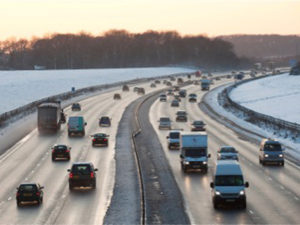Warning for fleets amid ‘worst-ever winter breakdown cocktail’
Drivers and fleets are being warned about the risks of taking to the roads after an arctic blast brought treacherous conditions across many parts of the UK.

The RAC has warned of a “worst-ever winter breakdown cocktail”
Snow and ice have impacted much of the UK, resulting in roads chaos, school closures and grounded planes. The widespread travel disruption has seen drivers stuck for hours on the M25 and passengers waiting on trains all night Sunday. And more snow is forecast for this week.
The RAC warned that a combination of factors had created a “worst-ever winter breakdown cocktail” after it saw record demand for breakdown services on Monday.
RAC Breakdown spokesperson Rod Dennis commented: “Yesterday was officially our busiest day for breakdowns on record, with around 12,000 drivers needing help, the equivalent of eight every minute of the day. Even our busiest day during the infamous ‘Beast from the East’ in 2018 didn’t see as many people breaking down.”
Such a ‘perfect storm’ for breakdowns has been driven by two main factors: a sustained period of cold weather with an absence of widespread snow that would otherwise keep people indoors, and a big rise in the number of drivers who can’t afford to maintain their vehicles to optimum levels, due to the pandemic and the cost-of-living crisis.
The RAC also warned that conditions remain challenging and urged drivers who do still need to travel to take the utmost care.
“Hazardous road conditions are continuing this week following another major refreeze overnight. Those who have to use more rural roads that haven’t been gritted will need to exercise great care, delay or even abandon their plans. Before setting out, allow some more time to de-ice and de-mist your vehicle thoroughly. We urge drivers who have to make essential journeys to leave extra space behind the vehicle in front, reduce their speeds to give plenty of time to stop.
“Anyone still wondering if it’s worthwhile carrying an emergency winter pack with them should imagine how it must have felt for drivers stuck on the M25 for eight hours yesterday. Carrying warm clothing layers – including a waterproof jacket – as well as a blanket, sturdy footwear, a flask of hot drink and power bank to keep phones charged are all extremely important.”
Meanwhile, commercial motor insurer Zego has warned that delivery drivers could be at particular risk on the roads this season as demand for online shopping remains high post-Covid and consumers are reliant on this community to deliver their orders in time for the festivities.
Sten Saar, chief executive, said: “Brits have become increasingly reliant on delivery drivers, a trend which really took off during the pandemic. If we could, the majority of us would choose not to drive during the winter. However, delivery drivers’ livelihoods depend on them doing so regardless of the conditions, making it even more important that we’re considerate of the pressures they’ll face in the run-up to Christmas.”
There are also reports of employers forcing drivers to head out despite the official warnings – prompting the legal experts at Bolt Burdon Kemp to explain whether employers have the right to force people to work or travel in dangerous weather, as well as what happens (and who is liable) if an employee has an accident as a result.
Charlotte Dowson, associate in the Complex Injury Team at the specialist claims solicitors, expresses the firm’s view, saying: “If an employer fails in their duty of care to adequately protect their employees from the effects of working in cold environments, then an employee who suffers a related injury or illness may be able to make a personal injury claim. The court will consider the circumstances in which the incident occurred and the steps the employer took to avoid the risk of illness or injury.”
She also had the following warnings: “If an employee is forced to drive in snow and ice and they are involved in a road traffic collision, then damages for the collision (both for the injuries sustained and any vehicle damage) may be covered by their employer’s insurance regardless of who caused it. If another road user caused the collision, then the employee may be able to pursue a claim against the other road user’s insurance company instead.
“However, if an employee is at fault, the concept of vicarious liability will kick in. This simply means that an employer will be held responsible for their employee’s actions whilst driving a company vehicle, especially if they are on duty when the collision happened.”













